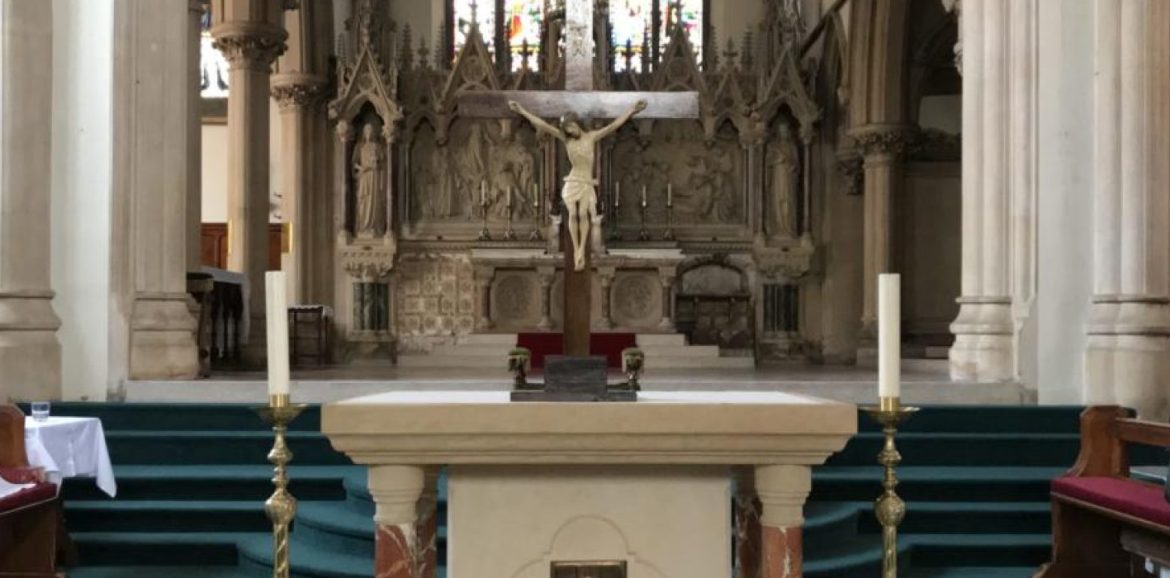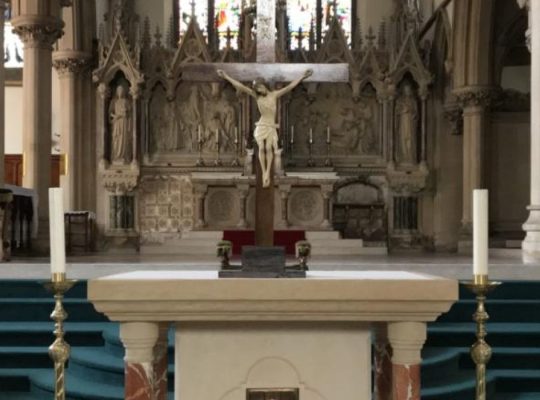Just a Thought
Immediately after Jesus had instructed the lawyer from last Sunday’s Gospel, to go, and do the same as the Good Samaritan; the meeting breaks up and we find him once again on the same ‘Road to Jerusalem.’ He went up through Jericho towards the Holy City. He stopped at a ‘certain village’ as Saint Luke calls it; Saint John lets us know it is Bethsaida, a small residential place on the east side of Olivet, where the road from Jericho divided. In this place there were old friends, and he would be assured of a warm welcome from a family that was devoted to him, a family, which consisted of a brother and two sisters. They were quite well to do, and commanded respect in their little town. Long since they had come to know and love the Lord. The youngest sister Mary is purported to be Mary of Magdala.
Had he not befriended the youngest in Magdala, and saved her from her terrible surroundings, and restored her good name by keeping her with himself, and then sending her home to her heart-broken sister and brother? Perhaps they would never have met.
How they rejoiced at her return at last? For all this how could they ever repay him? Whenever he passed that way they welcomed him into their home, as long as he would stay with them, all they possessed was gladly placed at his service. Nothing was too good for him; thus their gratitude soon grew to love, and this love was rapidly opening their eyes and finding faith, fanned into flame by the friendship returned of Jesus, for Lazarus, and Martha, and Mary.
In today’s Gospel we see Jesus stopping at the house of his friends. The two sisters welcome the Master, but the contrast between their respective attitudes gives him occasion to speak of what is involved first and foremost for the disciple who will welcome him when he comes. Thus, it is still a question of a disciple’s proper ‘activity.’
This story is one of the most well-known, even if it’s sometimes read in a superficial manner. We look at Martha and Mary’s contrasting attitudes to make a case for that which we call ‘activity,’ on the one hand, and ‘contemplation’ on the other. The pronouncement that ‘there is need of only one thing [and] Mary had chosen the better part and it will not be taken from her’ is frequently cited, more or less appropriately, seriously or in jest. It is worth reading this Gospel of Luke, as if it were the first time, and let it speak afresh to us.
‘As they continued their journey [Jesus] entered a village where a woman whose name was Martha welcomed him. She had a sister named Mary….’ It would seem from this account, that Martha was the owner of the house, and that Lazarus their brother lived elsewhere, no doubt with a household and family of his own, although we are not told this. Today at the upper end of Bethania on the slope of a hill, a ruined foundation of an ancient house is shown, and is called the home of Martha and Mary. It is into this house that‘the Master enters and stays a while.’ The introduction to this Gospel story, especially when read aloud, sounds like the beginning of a Ballard that will tell a story that is supposed to be an example for everyone. By introducing the two women with well defined characters, with no details given as to time and place, the story preserves a certain freshness. ‘Martha and Mary?’ Not distant personages, but so near to us that we all can recognise ourselves in them.
Here, then, are two sisters who welcome Jesus the ‘Lord’ but each in her own characteristic, loving way. Martha busies herself to receive Jesus properly. Mary, who ‘sat beside the Lord at his feet,’ stays there to hear his words, indifferent to the busy activity of her sister, who finally becomes exasperated. Her reaction is eminently understandable; who would not agree with it? Mary is taking it easy. What indolence, letting her sister do all the work!
The two women showed their love, though each in a different way. For Martha: she was the elder. She owned and managed the house; hers was a practical mind, a practical love, finding its delight in work, its sanctity in serving others.
Mary, on the other hand, the younger, was also the deeper thinker; she was one of those who must either be a great a saint or a great sinner. For good or for evil she could ‘love much’. Having experienced her recent past, she could see further than her sister into the souls of men and women, while she now lived her contented life at home the call of the greater life was always drawing her, whether to the wider world beyond little Bethania, or to the new world into which the Son of Man, whom she loved, had given her an insight. She could work like Martha, but never with the same zest. Martha could give her whole service, Mary only lent herself to it. Martha could see no better proof of love, Mary could sit back and realize that just love itself was its own best proof; that though love is shown in deeds, yet in its fullest sense it is more than any deed can show. It is love for love, self given for self; it is being, which is more than doing. Martha, feels she must remonstrate; but instead of confronting her sister about doing all the work directly, Martha asks Jesus to intervene; she must have the child corrected from her dreaming ways. For this was no new thing; it was a growing habit. Mary loved best to be alone, and often enough was a trouble to those about her. To her elder sister she would not listen, because she could not, listen; she was kind, she was considerate, she thought little of herself, but in this matter of her dreaminess, her long hours of silence, and then of impetuous outpouring of herself in word or deed, she was incorrigible. Now at last there might be hope. If she would not listen to her sister Martha— to Jesus surely she would listen. Martha hoped Jesus would admonish her to become more normal (as Martha saw it) to live as others lived and do as others did. Such an opportunity was not to be lost.
But see how the story transpires, as parables often do. At first, we spontaneously side with Martha, agreeing with her point of view and reaction. Martha busies herself to receive Jesus properly.
Mary, as we are told ‘sat beside the Lord at his feet’ and stays there to hear his words, indifferent to her sister’s busy activity. Here we see two women with well-defined characters. Here then are two sisters who welcome Jesus the ‘Lord’ but each in her own characteristic way. Understandably, Martha becomes exasperated with the situation, and turns not to her sister but to the Lord.
‘Lord, do you not care that my sister is leaving me to do all the serving all by myself? Please tell her to help me.’
Surely this was a sound piece of reasoning; surely she was pleading for what was common sense. Yet he did not respond at once. He looked at her patiently, affectionately, for in Saint John’s Gospel we are told ‘Now Jesus loved Martha and her sister Mary’ and the name Martha comes first. He could not blame her zeal. He could not find fault with her self-sacrificing charity. Nevertheless, there was something else, which for the sake of all mankind, he must seize this occasion to defend. To work for him was good, but to love him was better; to serve him was a glory; but to live with him was a greater glory still. It was noble to be his handmaiden, but to be blessed among women was nobler. To seek the means to please him was holy, but to seek first the kingdom of God and his Justice was to secure that all the rest would come.. Martha stood for much that was best in the world, but Mary represented something more that transcended all the rest; indeed, without it all the rest would be of little worth.
Is there an injustice here?
‘No’ responds the Master. All was written in his face as he turned himself towards Martha. He would not hurt her; yet Mary he must defend. He would praise Martha for the work she did, but Mary’s seeming idleness must no less be vindicated. The life of labour must be honoured; nevertheless, more honour must be given to the life of prayer. ‘And the Lord answering Martha said’ — ‘Martha, Martha, you are anxious and worried about many things. There is need of only one thing. Mary has chosen the better part and it will not be taken from her.’
What does this mean? This question has had many answers. The one that has been most influential goes back to Origen (185-254).
‘One must confidently affirm that Martha symbolizes action, Mary contemplation. The mystery of charity is removed from the active life if the goal of teaching and moral exhortation is not contemplation, for action and contemplation do not exist the one without the other. One should further say that Martha has received the ‘Logos’ [the Word] in a more corporeal fashion into her house, into her soul, while Mary has listened to it in a spiritual way by sitting at his feet.’
According to this oft repeated interpretation, the two sisters represent two complementary attitudes and/or stratified religious classifications: action and contemplation. Complementary, because every disciple must be at once ‘active’ and ‘comtemplative’; stratified, because ‘action’ led to ‘contemplation.’
At the beginning of the journey to Jerusalem, Luke has collected certain teachings of Jesus on the mission of the disciples. After the parable of the Good Samaritan last week, the lesson of Martha and Mary must be of capital importance. And this is found quite clearly, in the conclusion of the story.
Jesus does not condemn the zeal and generosity of Martha. He gratefully accepts her eager hospitality. But he gently reproaches her for being ‘anxious’ and ‘upset’ about many things. This is not the only time Jesus warns his followers against being overwhelmed with cares. But one must understand what is said here in light of what was said on those other occasions —(Luke 12:22-23) — (Luke 12:11-12) — (Luke 8:14) etc…
In each instance cares are denounced because they detract from what is essential: the confession of the Son of Man before judges, the primary search for the kingdom, receiving the Word, waiting for the coming of the Son of Man.
So here it is The ‘details of hospitality’ with which Martha busies herself distract her from listening to the Word that Mary understands to be essential, the ‘only thing required.’ The choice will not be denied. There is more at issue here than a conflict of duties: it is a rule of life that makes listening to the Word in faith a priority. Clearly this is not just an anecdote that Luke recounts, telling how one day two sisters welcomed Jesus.
The entire bible, Old and New Testaments — extol in countless ways the virtue of hospitality. In the guest that we welcome, it is always, in some way, God who visits us and who, through the guest, may bring us a message. The Gospels attest that at various times Jesus explicitly and solemnly declared that it is he himself that one receives in the weak, the poor, the afflicted, and also in his messengers. We will be judged according to what we have done or have failed to do with respect to those who need our welcomed assistance. We can exclude no-one, since the neighbour is the one to whom we make ourselves present. But this ready and active reception of neighbour cannot, however, dispense with the need to receive the Word and open ourselves to the mystery of the coming of the Lord. It would become a deception if it distracted from what is essential — from the ‘only thing required.’ The reception of God’s gift to us of himself, of his Word, which allows us to recognise our neighbour.
‘This is my Son, the beloved. Listen to him.’


